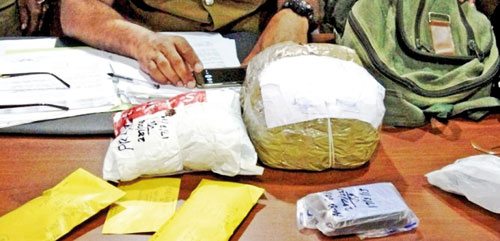Sunday Times 2
Drug free Sri Lanka
The above is a slogan of the Police Narcotics Bureau and the wishful thinking of majority of Sri Lankans who don’t use narcotic drugs. The percentage of drug users and abusers is very much less than those who did not experiment with any narcotic drugs. Every year the aim of law enforcement agencies is to reduce both the demand and supply of narcotic drugs. However, from the statistics available in the annual report of the Police Narcotics Bureau, it is apparent that the quantity of narcotic drugs detected and the number of persons arrested in 2015/2016 is no indication of reduction in both demand and supply.

A detection of narcotic drugs
It may be observed that there is a big jump in the quantity of heroin seized in 2015 which amounts to 46 kgs, whereas in 2016, the quantity seized amounted to 206 kgs. The total number of persons arrested for heroin use in 2015 is 26,539, whereas in 2016, the total was 27,458. This clearly indicates that the demand for heroin is on the increase and suppliers too have responded by illegally smuggling more heroin to meet demand.
Reduction in demand
The law enforcement agencies, the Police Narcotics Bureau and all the police stations must plan out sustainable ongoing programs to engage in educational programs, especially in schools, vidyalayas, colleges, amongst members of the public and other social clubs, in order to educate the masses, especially students who have left school and are unemployed. They end up using narcotic drugs due to frustration and peer pressure.
Initially the drug dealers entice youth by spreading false propaganda of the power of using narcotic drugs to have fun and enjoy life, especially in the area of sexual pleasure. The lured youths and others fall into the trap of such a pleasurable future and end up as drug dependents, ruining their lives, their health and the lives of their near and dear ones. It is for the law enforcement agencies, especially the police, to liaise with the Education Department and get its assistance to conduct such educational programs as a compulsory subject in all schools. The vast majority of the student population and youths who don’t abuse drug should be protected and prevented from falling prey to the machinations of drug dealers.
Reduction in supply
The annual report of the Police Narcotics Bureau has commended the support of the Sri Lanka Navy in the detection of heroin and cannabis on the high seas. It is a fact that the entire quantity of heroin and ganja is smuggled into this country through the airport and other landing points, through fishing boats.
Except for a few Pakistanis and other foreign nationals who fly into our country with narcotic drugs, especially heroin, the balance bulk of heroin comes through fishing boats. The navy has a big role to play in controlling the areas identified as illegal landing points in order to detect boats coming in with narcotic drugs.
The customs too has played a big role in detecting smuggled heroin which is brought into the country by airline passengers who engage in various dubious and novel means of concealment to smuggle heroin into the country. The police, Police Narcotics Bureau and the Special Task Force too have lent their support in detecting smuggled drugs. These seizures prevent narcotic drugs getting into the hands of suppliers which causes a supply reduction.
Combined effort
A combined special team drawn from several agencies who are engaged in drug law enforcement should be formed under the aegis of the National Dangerous Drug Control Board (NDDCB) to engage in supply reduction operations. In some quarters there was suggestion of enhanced punishment for drug offences. Maybe those who are advocating enhanced punishments are not aware of the death penalty in force for the past 30 years or so. Even the death penalty has not prevented people from engaging in trafficking in drugs. However, preventive campaigns have brought in the desired results in keeping youths away from drugs. The Police Department, spearheaded by the Police Narcotics Bureau should through the concept of community policing, plan out regular, continuous, sustainable preventive educational programs to be conducted to undertake demand reduction. The three P’s, pasal, pansal and police, should join hands to educate youth about the dangers of using narcotic drugs in order to keep them away from experimenting with such drugs.
We should all strive to achieve our wish of a “Drug free Sri Lanka”.
(B. Anton Jeyanathan is a retired Deputy Inspector General (DIG) of Police)

